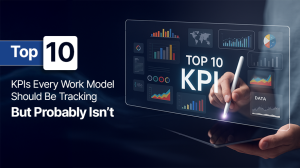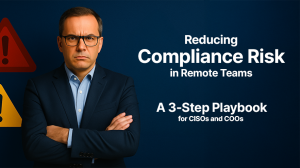Table of Contents
Running a healthcare BPO means handling a massive amount of sensitive information including patient data, personal identifiers, financial credentials, and so on.
One minor compliance overlooked, and you are into legal complexities and prolonged reputational damage. In addition, the aftereffects of any cyberattack are often costly and may even halt your operations for a very long time.
Well, this doesn’t have to be like this.
Thanks to emerging technologies like AI-driven data protection or AI cybersecurity solutions for healthcare BPO—now you can minimize data risk and maximize compliance protection without adding any complex procedures.
In this blog, we will explore why traditional methods are falling short with evolving cyberattacks and how adopting an AI-driven data protection software in your BPO can elevate your data security and help you meet enterprise-grade compliance standards without any extraordinary efforts.
The Need for AI-driven Data Protection in BPOs
Over 73% of the healthcare providers still rely on legacy systems to handle their core operations including patient data management and protection.
With the constant increase of cyberattacks, making the healthcare industry the prime target for cybercriminals, it’s clearly evident that legacy systems are no longer serving the purpose of data protection in today’s digital age.
If you are also leveraging traditional systems as a security measure to protect sensitive data, there is a high chance that your compliance safety is at risk in our digitized world. This is because legacy systems are not built for complex cyberattacks that businesses face today. Moreover, these traditional systems are considered as a bad or outdated practice for data protection in healthcare according to the US government.
Before we dive into the benefits of leveraging AI-powered data protection solutions for your healthcare BPO, let’s understand how legacy systems are falling short of helping you meet compliance standards and protect PHI.

Secure Your Healthcare Data Against Insider Threats, Compliance Gaps, and Vendor Risks with wAnywhere
Why are Legacy Systems Vulnerable to Data Breaches?
The legacy systems were built many years ago when cyberattacks were not that evolved and were less sophisticated in nature.
Being built upon outdated technology and architecture, legacy systems don’t have modern features such as multi-factor authentication, advanced encryption, and real-time threat detection that are a must-have to combat complex compliance challenges against modern cyber-attacks in the healthcare industry.
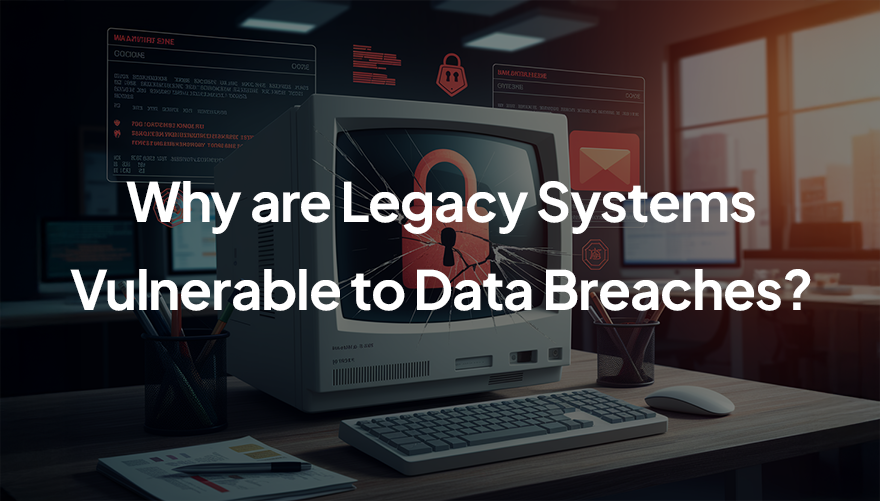
Legacy systems are vulnerable because of the following points:
No Vendor Support & Security Patches
These systems run on old software and operating platforms that are not even supported by the vendors nowadays. Therefore, they lack system upgrades and security patches that are needed to address emerging vulnerabilities.
This security gap makes it easier for unauthorized users to access sensitive data.
Incompatibility with Modern Security Tools
Many times, legacy systems can’t be integrated with emerging technologies like AI cybersecurity solutions or AI-driven data protection software in healthcare BPOs, expanding security gaps.
Even if you connect legacy systems with newer systems or external networks, one single weak connection can become an entry point for hackers.
Complexity and Limited Visibility
Legacy systems are also very complex to use because, over time, they develop layers of codes and configurations that the newer generations of IT professionals might not understand. Moreover, these traditional systems require a custom-built approach without proper documentation of their internal functioning.
If your IT staff lacks visibility and necessary skills in the functioning of legacy systems, it becomes challenging to identify security gaps and address them properly.
Weak Authentication Mechanisms
Legacy systems also rely on basic access control, single-factor authentications, or weak encryption methods to protect your data. Unfortunately, cyber attackers can bypass these security protocols, gaining access to sensitive data very easily.
For instance, an Australian healthcare insurance company, Medibank, fell prey to a huge data breach incident because of a weak authentication process that allowed hackers to easily access sensitive information. Since the bank didn’t realize the importance of robust authentication processes, this incident affected 9.7 million individuals, compromising their personal, medical and financial information.
Read more: How to Prevent Data Breach in Healthcare: A 2025 Guide for CISOs
Remote Environments
How would you ensure that your team and the computer system they use are adhering to the compliance policies? Without an effective employee monitoring system in your remote operations, it becomes challenging to track your teams’ activities. There can be instances when your employees can:
- Leave the system unattended, increasing risks of data exposure to unverified users.
- Use computer systems and networks that are outdated and unsecured.
- Transfer sensitive data into their personal devices, leading to data theft
AI-driven data protection for BPO: What is it and how does it work?
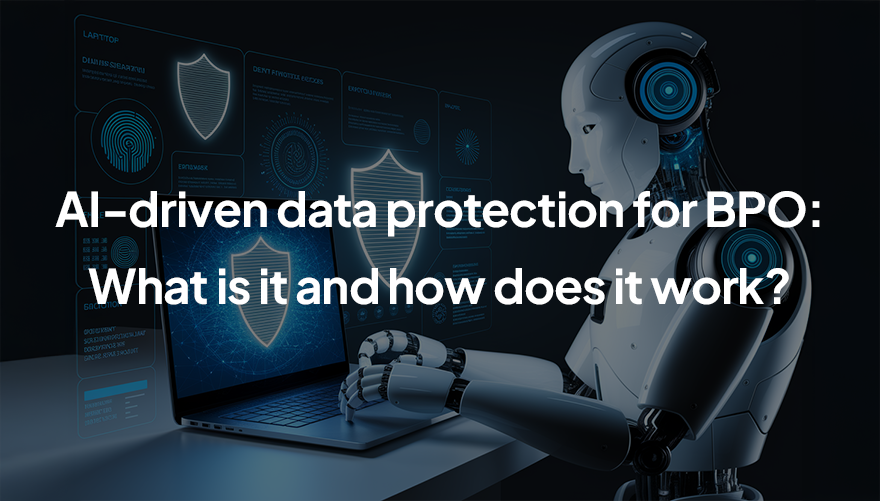
AI-powered data protection software for BPOs is an automated system that leverages artificial intelligence and machine learning to safeguard sensitive information from cyberattacks. In the healthcare industry, these tools aim to facilitate a secure environment for PHI and electronic data, helping medical organizations to comply with HIPAA, GDPR and other security certifications.
These AI-driven cybersecurity solutions run in the background of your systems, continuously monitoring and detecting anomalies and vulnerabilities regarding data safety in your operations at every moment. With these tools in action, you can automate data security to many extents and take off the burden of manual security measures.
Benefits of AI-powered Data Protection Solutions in Healthcare BPOs
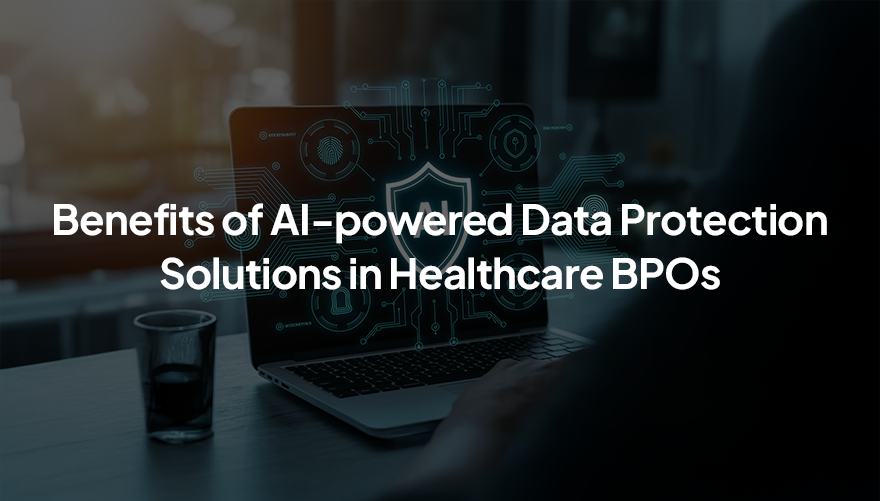
AI tools for data security offer multiple benefits to healthcare BPOs that legacy system fails to provide. Companies are already adopting AI-powered risk management solutions for healthcare services because of the following benefits:
Reduced Human Errors
Ensure there are no unnoticed errors during compliance report-making, audits, and data sharing. You can also leverage HIPAA compliance software for your medical outsourcing process, which can automate security protocols, reducing errors that could lead to regulatory compliance issues and hefty penalties.
Cost Effective
AI-driven healthcare cybersecurity solutions provide a holistic approach, including compliance monitoring, automating audits, and generating breach reports. Instead of investing in mainstream SaaS-based or traditional systems, you can leverage one-stop AI platforms for data protection in your BPO.
Moreover, these tools come with a user-friendly interface, allowing you to save resources on training teams or developing technical expertise.
Scalability & Adaptability
Whether your team works in remote, hybrid, or on-site work environment, healthcare cybersecurity AI-powered solutions can adapt to your unique workflows and use cases. These tools offer an API-first approach, so you can use them with your existing tech stack without disrupting your daily workflows—bring flexibility and scalability in your security efforts.
This allows you to become adaptable to evolving threats and regulatory policies, helping you stay one step ahead of the game.
Read more: AI Compliance Software for Healthcare BPOs: Maximizing Security and Data Protection
How Healthcare Cybersecurity AI Solutions Helps in Data Protection
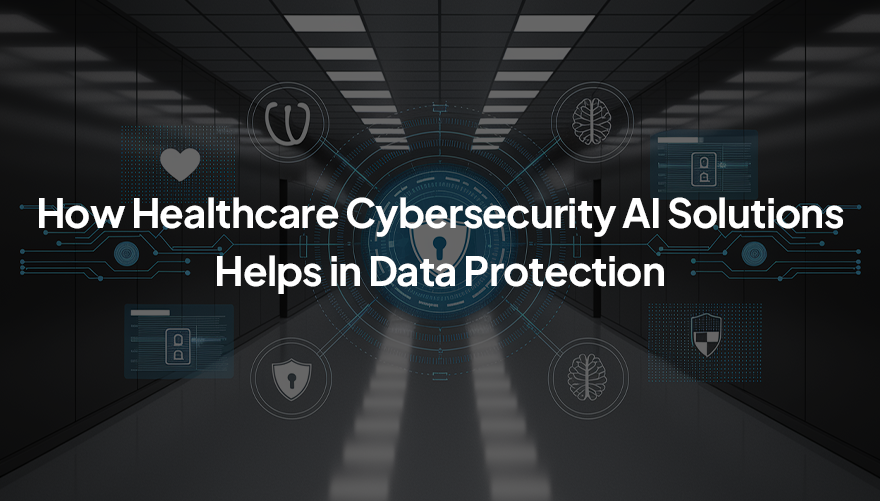
Adopting Healthcare Cybersecurity AI Solutions, that are often built on Zero-trust architecture (ZTA), offer a variety of robust features like:
Intelligent Access Control and Verification
Unlike traditional systems, AI-powered compliance software offers advanced role-based access control (RBAC) to allow only authorized users to interact with patient health information, minimizing risks for data theft and data leak significantly.
- It offers facial recognition systems that act as a multi-factor authentication process, adding an additional layer of layer to your security protocol. For instance, even if multiple people are working in a team, only dedicated users with role-based access can access the sensitive information, preventing unverified users from accessing the data.
- AI tools can track the working location of your distributed teams to identify in real-time if your employees are working from secured locations where data security is not an issue.
- Not only does it track locations, but it also restricts geographical boundaries with geofencing capabilities. Whenever a user tries to go beyond designated work location, the AI flags an alert so you can take proactive measures.

Comply with HIPAA Effortlessly with wAnywhere’s AI Compliance Solution
Detect real-time threats and automate incident response to ensure risk-proof operations.
AI Monitoring & Threat Detection in Real-time
What if you could spot data risks and potential compliance gaps even before they happen? Incorporating AI-powered risk management for healthcare operations provides real-time insights into how your teams (even remote teams) handle PHI at every second of their work.
The AI software constantly runs in the background of your computer system, tracking camera, USB ports, mouse & keyboard activities, and more to know how each team member interacts with data. Using AI tools can also help you to enforce a clean desk policy in your operations effortlessly.
These tools offer advanced monitoring features like:
- Screen/Person Monitoring helps you to track real-time, on-screen activity and person behind the computer, detecting unauthorized attempts to access or share PHI.
- Multiple Person Detection identifies unauthorized users coming into the sphere of the screen that displays PHI, preventing data exposure at co-working places.
- Multiple Voice Detection flags alert when AI detects suspicious or unidentical voice near the system, ensuring employees to display compliant behavior at work.
- Not-at-desk Detection to instantly identify when the system with PHI has been left unattended, preventing incidents of unauthorized data exposure and system theft.
With such robust features, your healthcare BPO can meet HIPAA and other compliance standards effortlessly.
Incident Detection and Response
One of the most powerful features that AI-led data security solutions offer to healthcare BPOs is going beyond just monitoring and providing real-time defense mechanisms to flagged threats. These tools alert management or stakeholders right away after identifying suspicious activities or unusual patterns regarding data handling. Moreover, AI tools also block the systems containing PHI to neutralize threats before they spread further.
Using AI regulatory compliance software for your healthcare operations can automate audit logs for you. These audit reports can help you to conduct HIPAA compliance checks without hassle, saving your team from manual regular audit checks.
AI cybersecurity solutions also help you in remediation workflow by deeply analyzing employees’ behavior and work patterns. It also delivers you a chronological report of each employee regarding data handling from day one. This helps leaders to identify potential gaps, implement corrective measures and eliminate vulnerabilities to upgrade their security efforts at every step.
Automated Privacy Protection
When insider threat becomes the major reason for data and compliance risk, it’s important to turn to technologies that help you to safeguard PHI against your own employees’ negligence and malicious intent. That’s when you precisely need an AI-powered data protection software for your healthcare BPO.
Leveraging an AI-powered HIPAA compliance software for your healthcare operations helps to automatically mask PHI or PII when your employees are interacting with clients or customers via email or screenshare. This functionality reduces risks associated with insider threats or human errors, boosting compliance safety and security standards.
You can also get a granular view of your employee’s activities through screenshots. AI automatically captures screenshots of computer systems to give you proof of work. Screen captures not only boost accountability but also help to identify threats better and conduct audit reports.
Conclusion
As the healthcare BPO industry keeps on relying more on digital platforms and technology to manage operations, the possibility of data threats and vulnerabilities also rises. That’s where AI-powered healthcare data protection solutions come into play. When cyberattacks are evolving, it’s high time healthcare BPOs should also invest and explore the robust capabilities of AI in protecting data of your BPO.
Evidently, Integrating AI cybersecurity solutions in your healthcare operations will help you to mitigate data risks, maximize compliance security, automate threat detection and incident response. With all these transformative and scalable solutions, AI will stand as a pillar in data security in healthcare BPO.
At wAnywhere, we work with some of the world’s top 10 healthcare BPOs, helping them to meet compliance standards and maximize data protection at every step. With API-first approach and 3 minutes installation process, we offer scalable solutions like threat detection, compliance monitoring, and incident response—all powered by AI.
From our years of experience working with healthcare BPOs, we know what challenges this industry faces and how we can offer easy-to-use compatible AI-powered data protection solutions for almost every use case and workflow.

Match the Data Security Standards of Leading BPOs
Achieve enterprise-grade data protection with wAnywhere’s AI compliance solution


